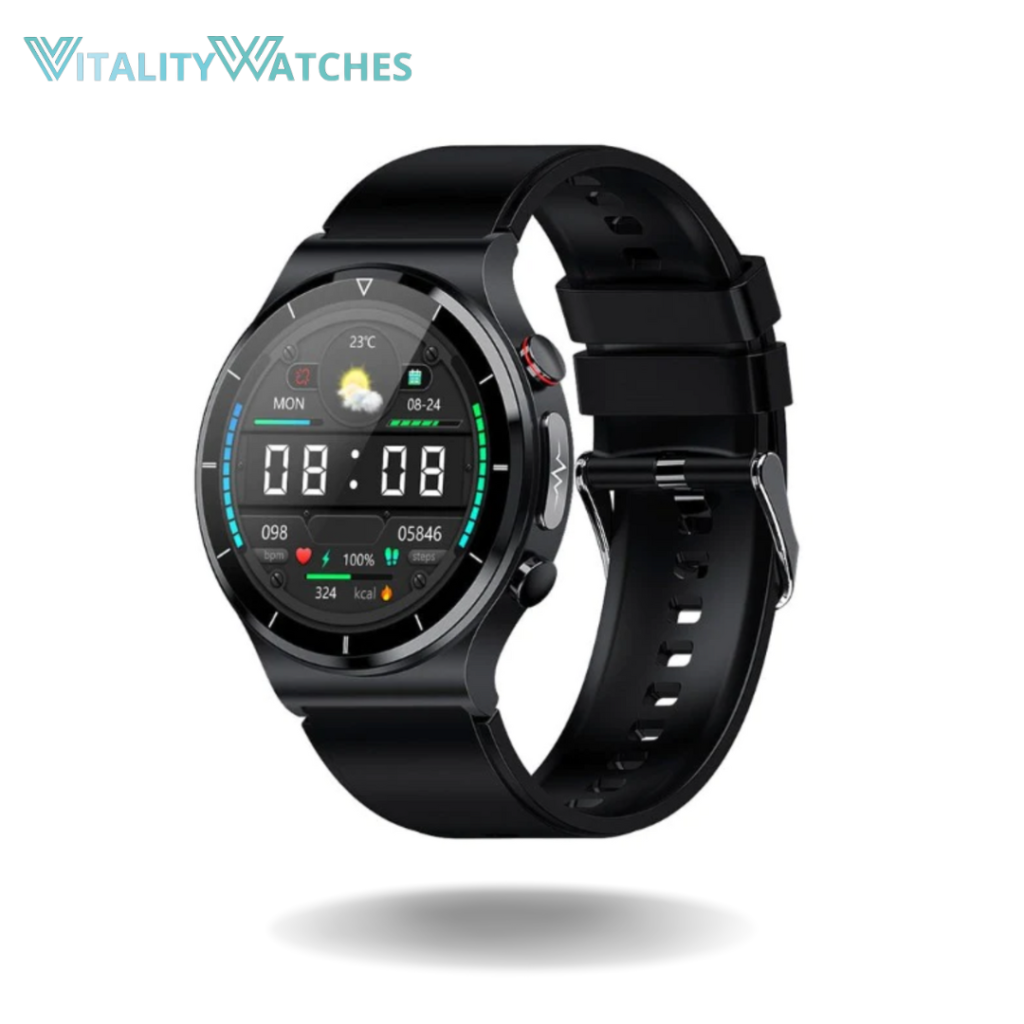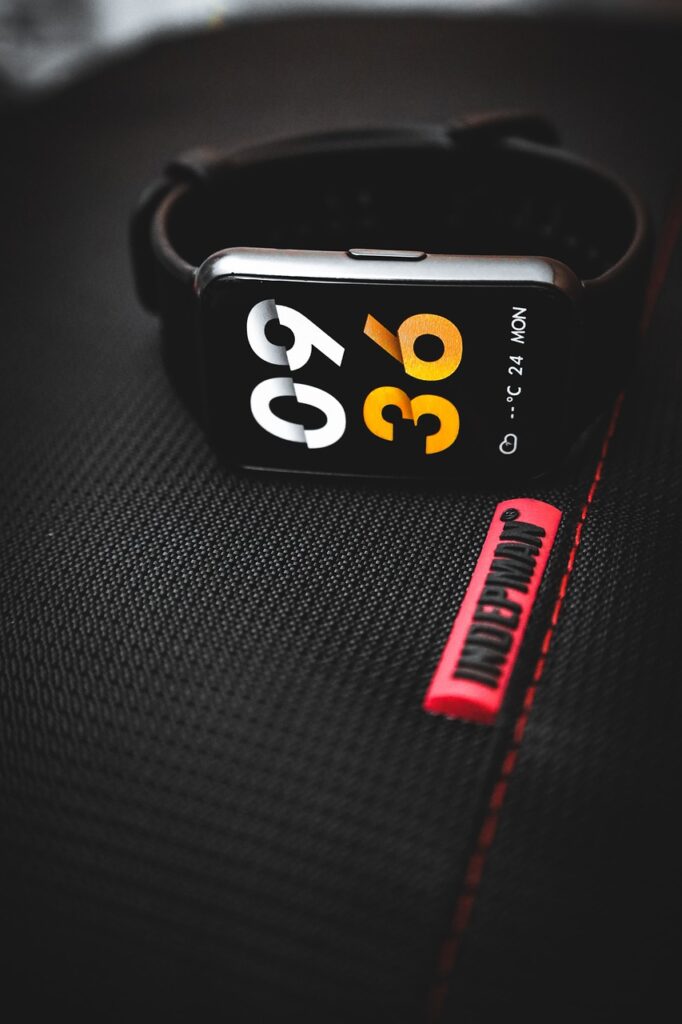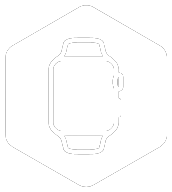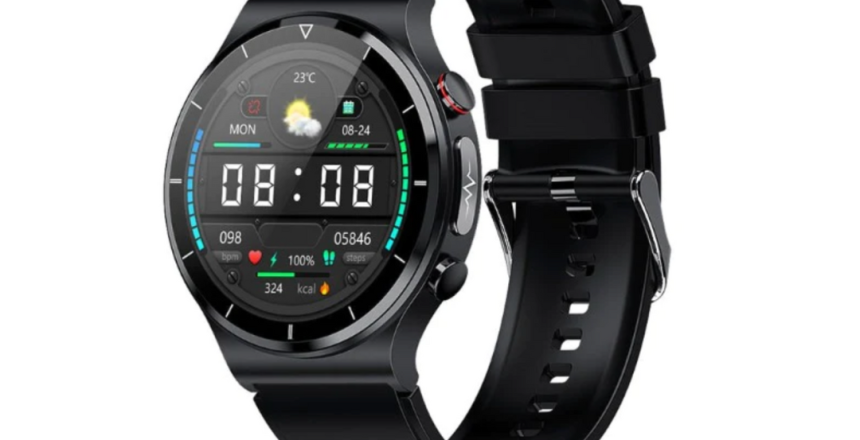
Fitness trackers and heart rate monitor watches have become increasingly popular over the last few years as people strive to find effective ways to measure their physical activity levels and keep track of progress over time. And, while you’d think having a wide range of options would make it easier to pick the right one, figuring out what essential features and capabilities can be overwhelming.
Here, we’ll dive into critical considerations when deciding between heart monitor watches so you can decide which watch/fitness tracker is best for your needs.
How Does Heart Monitor Watch Work?
Heart rate monitor watches use electrocardiography (ECG) sensors to measure your heart rate. These watches have electrodes embedded in their bands that detect the minute electric signals from your heart. These signals are then sent to a monitor, which interprets the data and shows it always on retina display in real-time. The ECG technology offers more accurate readings than other forms of heart rate monitoring.
Optical or photoplethysmography (PPG) is another type of heart rate monitor watch technology. This technology uses light to detect blood flow through the arteries and track the pulse rate of your heartbeat. An optical sensor on the watch shines infrared light into your skin to measure changes in blood volume under your skin.
PPG-based heart monitors are typically less expensive than ECG-based models. But, they tend to be less accurate than ECG-based models.
What Features Should You Look For in Right Heart Rate Monitor Watches?

Here are the key points to consider when choosing a heart monitor watch:
1: Function
The latest generation of heart monitor watches offers many functions beyond just tracking your workout sessions. Many models offer specialized sports modes for cycling, jogging, and other physical activities. Sports watch also has advanced features like monitoring stress levels, relaxation breathing timer, sleep quality, and other metrics such as VO2 max and recovery time. It can also provide alerts for high or low heart rates.
Furthermore, most watches come with step counters that automatically track the distance covered, how many calories burn information, and even elevation changes (for those who are more active outdoors). They may also feature a sleep mode that measures sleep stages, including REM cycles.
To get the most out of your watch, it’s essential to consider what type of activity tracking you need for your lifestyle or goals. This will help you decide which functions are necessary for your purposes.
It is also necessary to consider how these settings can be customized to your needs and medical needs. These settings can be customized by entering specific values such as age, weight, height, activity level, and other relevant parameters into the watch’s software. You can also create workout profiles that track specific goals or objectives related to your fitness performance.
Furthermore, does the watch has an app to synchronize phones and transfer exercise data between them? Some models come with apps that allow users to sync their data with their phone to monitor their progress away from home or historical access records for analysis purposes. This is particularly useful for athletes needing detailed statistical performance feedback. So, considering all these features, you can easily find the watch that best suits your needs.
2: Accuracy
Regarding accuracy, you want a watch that is up to the task. Most of the best pulse watches come with Global Positioning System (GPS) for enhanced accuracy and the ability to measure the pulse at the wrist.
These devices have been compared against known distances and more precise pulse straps to assess their effectiveness in providing accurate measurements. This is important to ensure your device provides accurate readings, giving you the best possible feedback on your performance.
3: Build Quality and Versatility
The build quality, durability, and versatility are important factors when choosing between heart monitors. Consider whether it is water-resistant to withstand sweat or rain during workouts. Also, consider if the case design is comfortable and fits the wrist perfectly. The display should also be scratch-resistant, as this will help protect it from everyday wear and tear.
Furthermore, some models are more versatile than others, offering the ability to switch between different screens and data readouts on the exact watch or even track multiple activities simultaneously.
4: Battery Life and Use
When choosing a heart monitor watch, it is essential to consider the battery life. Consider how long does the battery last when used for physical activity and regular everyday tasks? The exact battery life will vary depending on usage patterns.
Still, most models last around five days when used solely for workouts or up to several weeks if only used occasionally throughout the day. Standby times are usually much longer, so if you’re not using your device heavily, you should expect it to last several months without needing a charge.
Furthermore, also consider the controls are simple to use in every mode. Most modern heart monitors offer very user-friendly interfaces where any adjustments or changes you wish to make require just a few keystrokes or taps on its touchscreen display.
Different settings allow you to customize each mode according to your unique preferences while ensuring that all vital readings remain visible during workouts or daily monitoring activities. So, before buying a watch, consider all these aspects of finding the best suitable one.
5: Reviews:
Another critical factor is to check the reviews and ratings of the watch. Reading user reviews can help you understand what other people have experienced with that particular heart monitor and give you insights into its features, accuracy, build quality, and other factors that may be important to your needs.
It’s also a good idea to check the manufacturer’s website or online forums to find out how easy it is to upgrade or repair any problems that may arise with your watch in the future.
6: Price:
Finally, the price is essential and will vary depending on the offered features. Generally speaking, higher-end models offer more comprehensive features and better accuracy but are usually much more expensive than simpler monitors. A mid-range model may be more suitable and cost-effective if you start tracking your heart rate or monitoring activity levels.
So, here are the main points to remember when choosing the right heart monitor watch for your needs. Make sure to consider accuracy, build quality and versatility, battery life and controls, reviews, ratings, and pricing, before making a decision. Doing so will help you get the best heart monitor watch that meets your requirements.
Heart rate monitors are essentially small devices that measure the number of times your heart beats in one minute, also known as your “heart rate.” The watch then records this data and displays it in real-time on its display. Most watches come with other features, such as alarms or vibration alerts, to help keep you in the desired range while exercising. Using a heart rate monitor watch, you can ensure you get an optimal workout without overexerting yourself or risking injury.
Benefits Of Using A Heart Rate Monitor Watch
A heart rate monitor watch is a great way to keep track of your fitness and health goals. It can help you stay motivated and reach your goals faster, providing real-time feedback on how hard you work out and whether you need to adjust your intensity levels. Here are some specific benefits of using a heart rate monitor watch:
1. Improved Performance:
Monitoring your heart rate during exercise ensures you are training at the right level to maximize results. You can also use the data collected to adjust your intensity levels depending on what works best for you.
2. Increased Safety:
Knowing how hard your heart works during exercise helps keep you safe by avoiding overexertion or injury. A heart rate monitor makes it easy to understand when it’s time to rest or slow down before pushing too hard.
3. Better Tracking:
Heart rate monitors to provide detailed information about everything from calories burned and average speed to time spent in each zone and total calories burned throughout the day – so that you can better understand your workout routine’s effectiveness over time.
4. Easier Goal Setting:
When used with other tracking features, such as step count, calories consumed, and distance covered, a heart rate monitor watch allows for more precise goal setting based on individual needs instead of general averages or guidelines.
5. Stress Reduction:
Your heart rate is often an indicator of stress levels; accurately tracking them during relaxing activities like yoga or meditation and intense workouts can help reduce stress levels and improve overall mental health.
When Should I Call My Doctor or Healthcare Provider?

Call your healthcare provider immediately if you experience any irregular heart rhythm (arrhythmia) symptoms, particularly heart palpitations. Heart palpitations are the sensation that your heart is beating faster than usual or skipping beats, which can feel uncomfortable and unpleasant. This symptom usually indicates an arrhythmia, which various medical conditions such as hypertension, hyperthyroidism, and certain medications can cause.
Suppose you experience other signs or symptoms along with heart palpitations, such as chest pain, dizziness, fatigue, shortness of breath, and fainting. In that case, you must call your doctor immediately and get checked out.
Adults should also call their healthcare provider if their heart rate is abnormally slow (less than 60 beats per minute) or fast (more than 100 beats per minute). An irregular heart rate can be caused by severe conditions such as cardiac arrest or a heart attack, so seeking medical attention is essential.
Best Heart Monitor Watch Option – ECG Watch Pro

The ECG Watch Pro is an advanced heart monitor watch option designed to give you 24/7 continuous heart rate monitoring. It can track your breathing rate patterns and provide respiration rate monitoring, helping you detect any potential issues with your respiratory system.
This watch also has a blood concentration monitor that can help you track and potentially detect issues related to your blood glucose levels, such as diabetes. Furthermore, it comes with a body temperature monitor that will help you monitor changes in your body temperature and detect potential fever so that the necessary action can be taken to avoid health complications.
The best part is this excellent watch syncs seamlessly with both iOS and Android devices, so you can access the data from your phone or laptop and make the necessary adjustments to your lifestyle. Also, this watch is straightforward to set up, use, and take care of, making it an excellent option for those new to fitness tracking.
Last but not least, this watch also comes with a step and calorie counter that can give you insights into your physical activity from which you may set fitness goals and track progress in achieving your health & fitness objectives. With its advanced features, the ECG Watch Pro helps ensure you always stay on top of your health. So, if you’re looking for a reliable heart rate monitoring watch, the ECG Watch Pro is worth considering.
Click here to get to the ECG Watch Pro
Frequently Asked Questions:
Q: Who Can Use a Heart Rate Monitor Watch?
A: Anyone who wants to keep track of their physical activity and heart rate can benefit from using a heart monitor watch. It’s useful for athletes, health-conscious individuals, people managing chronic medical conditions, or anyone looking to stay on top of their health and fitness goals.
Q: Are Heart Rate Monitors Accurate?
A: Generally, heart rate monitors are accurate and reliable. However, it’s essential to ensure you buy a high-quality device from a reputable manufacturer to get the most accurate results when using your watch.
Q: When Should I Know the Results of My Heart Monitor Watch?
A: Usually, the results of your watch appear almost instantaneously. This allows you to take action right away or keep track of your heart rate over time to detect any changes or irregularities in your heart rate.
Q: What Are the Risks of Using Heart Monitor Watches?
A: Generally, heart monitor watches are safe to use and don’t have any significant risks associated with them. However, some people may experience skin sensitivities or allergies from certain materials used to make the straps, so checking for any potential allergic reactions before purchasing a watch is essential.
Q: Is it Possible to Measure Blood Pressure, Sleep Tracking, With a Heart Rate Monitor Watch?
A: Yes, some heart rate monitor watches are equipped with advanced features that can measure both blood pressure and sleep tracking. By using these features, you can gain insights into your overall health and ensure you stay on top of any potential issues.
Final Verdict: Heart Rate Monitor Watch
In conclusion, choosing the right heart monitor watch can be difficult. But by understanding your needs and researching new technologies & features (like the blood oxygen sensor, and blood oxygen saturation) available, you can make an informed decision that will help you better track and manage your heart health. With the ECG Watch Pro, you can easily monitor your heart rate and other vitals in real-time to ensure everything functions as it should.
There are also much other heart monitor watches or apple watch series available, so make sure to consider all your options before making a purchase. Beyond that, there are a number of other devices available that can help you monitor your heart rate like a chest strap, armband, smartwatch, and fitness tracker.
Ultimately, the right heart monitor for you will depend on your individual needs and preferences. So take the time to research different products before making a decision.



